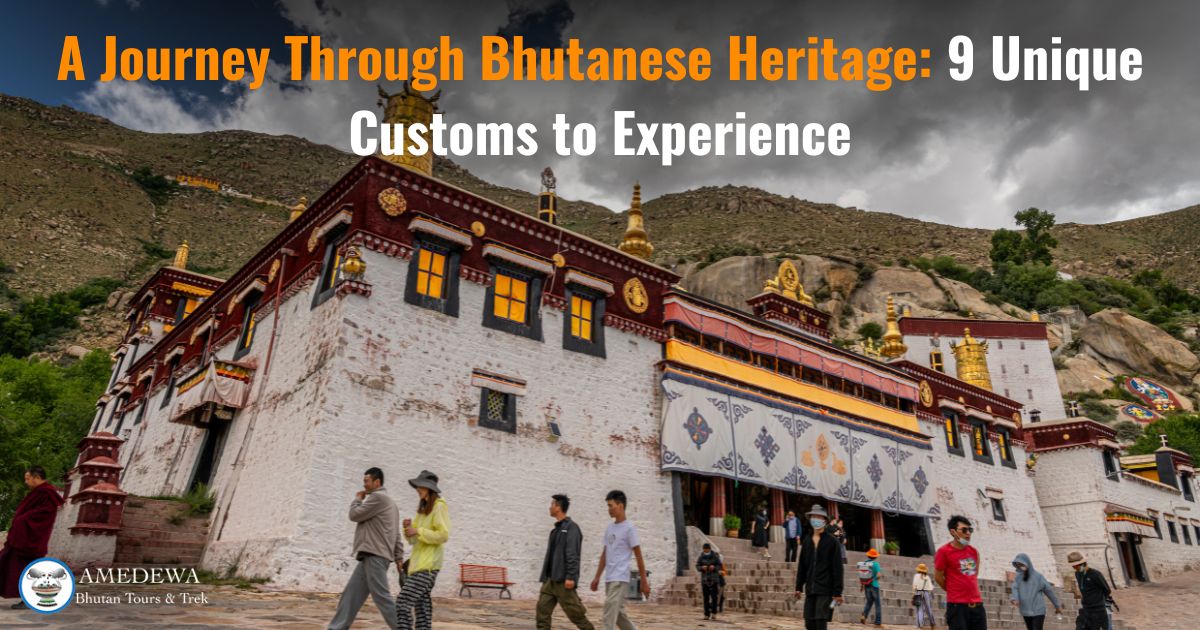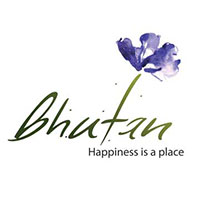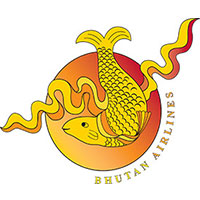Posted On: January 21, 2025 | By: adminadmin
A Journey Through Bhutanese Heritage: 9 Unique Customs to Experience
Nestled in the Eastern Himalayas, Bhutan—“The Land of the Thunder Dragon”—offers a unique window into a world where traditions, spirituality, and natural beauty blend seamlessly. Bhutanese culture is a remarkable tapestry of customs, rituals, and values that reflect the country’s rich heritage. This article delves deep into the nine key customs and traditions that define Bhutan, helping you immerse yourself in its captivating culture. Whether you’re planning your visit or simply curious about Bhutan, this guide will offer insights into its vibrant way of life.
For an unforgettable journey, relying on a trusted Bhutan tour operator is essential. They can craft an experience that lets you fully appreciate the cultural richness of Bhutan. Let’s explore the fascinating facets of Bhutanese culture.
1. Traditional Clothing
In Bhutan, traditional clothing isn’t just a relic of the past—it’s an integral part of daily life. Men don the “gho,” a knee-length robe secured by a belt called a “kera,” often complemented by a white scarf known as “kabney.” Women wear the “kira,” a long, flowing dress paired with a blouse (“wonju”) and a short jacket (“toego”). These colorful garments are made of hand-woven fabrics adorned with intricate patterns.
Traditional attire is mandatory in schools, government offices, and formal occasions. Beyond functionality, these clothes symbolize Bhutanese pride, unity, and artistic heritage. For tourists, experiencing Bhutan’s culture through its traditional attire can be a rewarding and immersive experience. A travel operator in Bhutan can guide you on how to fully embrace and respect this cultural aspect during your visit.
2. Festivals and Celebrations
Bhutan’s vibrant festivals, known as “Tsechus,” are a cornerstone of its cultural identity. Held in monasteries and fortresses (dzongs) across the nation, these events celebrate Guru Rinpoche, the founder of Tibetan Buddhism. The Paro and Thimphu Tsechus are particularly renowned, drawing both locals and tourists.
Tsechus are colorful spectacles featuring masked dances, music, and rituals that narrate tales of good triumphing over evil. Beyond their religious significance, these festivals are social gatherings where communities come together, dressed in their finest traditional attire, to enjoy local delicacies and participate in communal prayers.
Opting for customized Bhutan tours and packages ensures you can witness these vibrant celebrations and gain deeper insights into their significance.
3. Spiritual Practices and Monasteries
Spirituality forms the heart of Bhutanese life. Monasteries like the iconic Taktsang Monastery (“Tiger’s Nest”) are hubs of religious activity and pilgrimage. Monks and nuns dedicate their lives to prayer, meditation, and preserving Buddhist teachings.
Prayer flags fluttering in the wind and the lighting of butter lamps are common sights that exemplify Bhutan’s spiritual ethos. Visitors are often welcomed to participate in prayers, learn about Buddhist practices, and explore the intricate architecture of monasteries. A Bhutan tour operator can help organize visits to these spiritual sites, ensuring a profound cultural experience.
4. Social Customs and Etiquette
Bhutanese society values warmth, respect, and hospitality. Greetings often start with “Kuzuzangpo La,” accompanied by a bow and a smile. Respect for elders is deeply ingrained, and guests are treated with utmost care.
When visiting homes, it’s customary to remove your shoes and offer a small gift as a gesture of gratitude. Shared meals are seen as sacred moments for bonding, with dishes served communally to foster connections. Experiencing these customs first hand provides a deeper appreciation of Bhutan’s harmonious society.
5. Archery: The National Sport
Archery is more than just a sport in Bhutan; it’s a cultural celebration. Competitions feature teams aiming at targets 140 meters apart, accompanied by singing, dancing, and cheerful banter. These events are festive gatherings that strengthen community bonds.
For visitors, attending or participating in an archery event is a delightful way to engage with local traditions. A travel operator in Bhutan can help include this unique cultural activity in your itinerary.
6. Bhutanese Cuisine
Bhutanese cuisine is a flavorful journey that reflects the country’s geography and traditions. Staples include rice, often accompanied by spicy dishes like “Ema Datshi”—a stew made with chili peppers and cheese. Other popular dishes include “Phaksha Paa” (pork with red chilies) and “Jasha Maroo” (spicy chicken).
Meals are communal affairs that bring families and friends together, reinforcing social bonds. Traditional beverages like butter tea (“Suja”) and Ara (a local alcohol) are also worth trying. With customized Bhutan tours and packages, food enthusiasts can savor the best of Bhutanese cuisine.
7. Preserving Culture in a Modern World
Despite modernization, Bhutan has successfully preserved its cultural identity. The government’s philosophy of “Gross National Happiness” prioritizes well-being, environmental conservation, and cultural heritage over mere economic growth.
Policies promoting traditional attire, architecture, and sustainable tourism ensure that Bhutan’s cultural essence remains intact. By engaging with a knowledgeable Bhutan tour operator, visitors can experience this harmonious blend of tradition and modernity.
8. Education and Language
Education in Bhutan integrates cultural values with modern learning. Dzongkha, the national language, is taught alongside English, fostering bilingualism that helps preserve Bhutanese identity while preparing youth for the global stage.
Schools emphasize traditional arts, crafts, and environmental stewardship, ensuring that future generations carry forward Bhutan’s rich heritage. Tour operators often collaborate with local institutions, providing travelers with opportunities to learn about Bhutanese educational practices and cultural preservation efforts.
9. Sustainable Development
Bhutan’s commitment to sustainability is unparalleled. From promoting organic farming to conserving forest cover, Bhutan’s policies align with its cultural and spiritual beliefs. Nature is viewed as sacred, and environmental conservation is deeply ingrained in Bhutanese culture.
For travelers, this dedication to sustainability enhances the experience of exploring pristine landscapes, untouched forests, and eco-friendly communities. A travel operator in Bhutan can help you discover these sustainable practices while ensuring minimal environmental impact.
Conclusion
Bhutan’s culture is a captivating blend of ancient traditions, spiritual practices, and modern values. From its vibrant festivals to its unique clothing and sustainable development initiatives, Bhutan offers a glimpse into a world that values harmony, respect, and authenticity.
For those looking to experience the true essence of Bhutan, collaborating with a trusted tour operator like Amedewa Bhutan Tours & Trek ensures a seamless and enriching journey. Whether it’s exploring monasteries, savoring local cuisine, or participating in cultural celebrations, Amedewa Bhutan Tours & Trek provides personalized itineraries that bring Bhutan’s magic to life. Embark on this extraordinary adventure and create memories that will last a lifetime.





